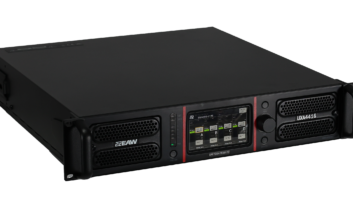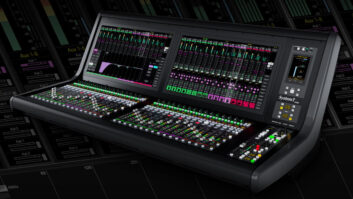The Value of Continuing Education for a Programmer
Oct 18, 2012 4:24 PM,
By Patrick Barron
There is not a single college degree that can completely prepare an AV systems programmer for all of the situations they will encounter in the course of working with a typical system. A programmer is required to not only understand the basics of computers, complex logic, and algorithms, but also how the various components of the system interact. Traditional colleges and technology institutes can teach the logic basics about programming, but many programmers learn programming on their own by doing research on the Internet and by reading books and other materials. Knowledge of AV is a never-ending pursuit that starts in many different places. Regardless of the path taken to become an AV systems programmer, we all continue to learn and increase our knowledge in the AV field along with learning new programming techniques.
Given the lack of university-driven courses and traditional means for continuing to grow as a programmer, many resources are available through the AV industry itself. Professional organizations exist where members can share information and new ideas. Manufacturers offer a multitude of training courses and various organizations sponsor training programs targeted at the AV industry. Some courses are general knowledge of audiovisual topics, but many are created specifically to teach the programmer needed skills to write software for particular systems.
AV CONTROL TRAINING
With technology changing rapidly and new equipment emerging on a monthly basis, the need to continue learning about new products and procedures is essential to being a successful programmer. Manufacturers of control systems have stepped forward to create extremely comprehensive training programs to continue the education of programmers and others involved with installing and selling their products. AMX and Crestron, for example, are two of the major control system manufacturers that have developed noteworthy training programs.
AMX has called its training initiative “AMX University.” Through AMX’s training process, a programmer can be certified and become an AMX Certified Expert (ACE). According to AMX, the ACE program “qualifies individuals as having the full range of knowledge and skills in a particular product category … ACE certifications are earned through a series of on-demand and classroom courses followed by written and practical testing.”
At Crestron, the training program is called “Crestron Technical Institute” (CTI). According to company, “The Crestron Technical Institute prepares you for the control system design and programming challenges facing commercial and residential AV professionals every day.” By completing a series of courses comprised of online material, in person classes and rigorous exams, an individual can obtain the designation of “Crestron Certified Programmer.”
Extron also has its own line of control systems and they have a one-day training class, which covers its MediaLink and TouchLink products.
THE IMPORTANCE OF CERTIFICATIONS
Manufacturer trainings and certifications are important not only to further the education and capabilities of the individual programmer, but they are also useful as a tool for measuring the qualifications of a prospective programmer. There is a vast difference between a legitimate programmer with experience and knowledge of control systems and a guy that happens to own a laptop and found access to the software. Programmers have been trying for years to find ways to distinguish legitimate professional-level programmers from hobbyists.
Consultants that are trying to find a qualified programmer for an upcoming project can specify particular certifications as requirements to bid on a job. If an integrator is looking for an independent programmer to contract for a large project or is trying to hire a new staff programmer, they can look for individuals holding the proper certifications. In many cases, a high-level programmer is desired, and both AMX and Crestron have methods to designate a programmer that has achieved advanced status beyond their standard certifications.
AMX has a group of specially selected programmers called Valued Independent Programmers (VIP), which according to AMX, “represent an elite level of AV control system programming and user interface design expertise. VIPs maintain yearly ACE certification, hold certification by at least one AV trade organization, and meet stringent business practice criteria to be hand-selected for AMX’s VIP program. What does this mean to you? Reliable, reputable, and thoroughly knowledgeable service for any project.”
Similarly, Crestron has a group of advanced level programmers it calls Crestron Authorized Independent Programmer (CAIP) that have achieved a higher level of accomplishment beyond the standard certification. According to Crestron, “The title of Crestron Authorized Independent Programmer is more than just a label. Having earned his or her stripes through intensive training and real-world experience, a Crestron Authorized Independent Programmer offers a much higher level of expertise and familiarity with Crestron than other independents.”
The Value of Continuing Education for a Programmer
Oct 18, 2012 4:24 PM,
By Patrick Barron
DSPs AND COMPONENTS TRAINING
A control systems programmer is much more than simply a person that understands computer logic and standard software. The task of a programmer is to make AV equipment operate in a desired manner. Even if the syntax of a program is perfect, a strong understanding of the equipment itself and how it works is required to program the system properly. Audio digital signal processors (DSPs) require a different type of programming to set up the audio parameters and controls in a system, but these pieces of equipment still need to be programmed. Many audio DSP manufacturers such as Biamp, BSS, Peavey, ClearOne, Polycom, and Symetrix offer multiday training courses culminating in certifications for their various product lines.
Programmers are also routinely called upon to control switchers, lighting, videoconferencing, and other subsystems. Many of the component manufacturers offer training on the individual product lines, and training is available to programmers as well as the system integrators to better understand how the product works. A programmer that understands how an AV system works and how the individual components function is much more likely to use that knowledge to program an efficient and easy to use system because they know how the equipment operates.
INFOCOMM’S CTS CERTIFICATION
General, good working knowledge of the AV industry is important to complete an integrated system. InfoComm has become the industry leader in training that is not manufacturer-specific, but is instead well rounded and broad reaching in its range of topics.
One of the most prestigious certifications available in the AV industry is the Certified Technology Specialist (CTS) offered through InfoComm. InfoComm offers CTS and two advanced CTS certifications specifically for system designers (CTS-D) and installers (CTS-I). According to InfoComm, “[Our] certifications are the only AV credentials to achieve accreditation through the International Organization of Standardization (ISO) and the International Electrotechnical Commission (IEC) ISO/IEC 17024 certification of personnel as administered in the United States by ANSI. InfoComm has offered its certification program for more than 30 years and every year certifies more qualified AV professionals than anyone else in the industry. Individuals, companies, and customers have always recognized the CTS certification for its credibility and integrity.”
A programmer with the dedication and desire to obtain the CTS certification shows the highest level of commitment to excellence. While CTS certification is not required to be a competent programmer, it does show a higher level of understanding about how the systems work together, which translate into the ability to write a program that uses the equipment properly. Many excellent computer programmers have failed as control system programmers because they do not understand AV and how the components work together. It matters little if a program compiles properly without errors if the purpose of the AV components is not understood.
The Value of Continuing Education for a Programmer
Oct 18, 2012 4:24 PM,
By Patrick Barron
ONGOING CERTIFICATIONS
Going to a series of training class and obtaining a certification does not automatically ensure that a person stays educated and informed about current trends in technology and updated on new equipment. Most manufacturers offer continuing education and have requirements for maintaining certifications that are renewed on an annual basis.
Crestron has an extensive ongoing training program that is held on an invitation-only basis to the programmer that has already achieved certified status. From the company’s website: “A Crestron-certified programmer holds the highest respect in the industry due to the rigorous training, extensive experience, and stringent testing required before achieving ‘Crestron Certified’ status. In order to help Crestron-certified programmers stay up-to-date, each year CTI offers exclusive and specialized Masters classes that are invitation-only to Crestron-certified programmers. Masters classes are an invaluable opportunity for programmers to train on the latest Crestron software and hardware, while networking and sharing knowledge with other programmers.”
AMX requires all ACE members to attend a mixture of online and classroom training to maintain their status on an annual basis. When a consultant or integrator verifies certifications they should make sure that the certifications are current. InfoComm has a special group comprised of some of the industry’s top programmers, which is called the Independent Programmer’s Council (IPC). The purpose of the group is to “serve the needs and interests of programmers of control systems, audio, lighting, and other systems who are not employed by hardware vendors or integrators. The council seeks to raise the stature of independent programmers in the industry, provide collective feedback to vendors, define standards of practice, and share professional resources.”
Over the years, the IPC has developed many valuable documents to help other programmers and to aid the industry as a whole to better understand programming concepts. The “Dashboard for Controls” has become a standard reference tool used by consultants, integrators, and end-users to define how a well-programmed system should operate. The IPC strives to help inform the general AV community what to expect from a professional, highly skilled programmer, and to distinguish that individual from rogue programmers. The IPC has released a new series of designations to further distinguish the high-level programmer and to give the consultants a set of criteria to use when specifying more advanced programmers for a particular job. The IPC has developed an InfoComm IPC Bronze, Silver and Gold programmer with the requirements outlined as follows:
Bronze
- Signed the code of excellence document
- Carries general liability business insurance
- Aware of and using the documents that the IPC has published when applicable:
–Roadmap to Control Quick Reference Guide
–Roadmap To Control
–Dashboard for Controls Design Reference
–Dashboard for Controls Design Guide
–Recommended Business Practices for Independent Programmers
Silver
- All items in bronze list plus:
- One control system manufacturer certification
- In business at least 3 years.
Gold
- All items in silver list plus:
- Two control system manufacturer certifications
- One member in company has InfoComm CTS status
- Has at least one other AV certification (such as an audio DSP manufacturer)
- In business for at least 5 years.
The goal of these new designations is to allow a consultant to specify a high level of programmer that has a broad range of skills. These designations place emphasis not only on programming skills, but also on running a solid business by requiring general liability insurance and a specific length of time in business. An individual might be a great programmer, but no one wins if their company goes out of business before a project is completed due to poor business skills. The companies that meet the above requirements are published in the 2012 IPC member directory found on the InfoComm IPC website. The list is available to the general public, so any system integrator that needs a highly skilled programmer can refer to this directory.
ESSENTIALS OF TRAINING
Continuing education through manufacturer training and participation in professional organizations are valuable resources that a control system programmer can use to stay current with industry trends and emerging technology. Training classes are essential to learn about new products and new programming techniques. Exchanging information with colleagues in organizations can be just as important when sharing tips and techniques that have to be learned through experience and are not taught in class. The certifications obtained by the programmer are important because it shows a dedication to excellence by acquiring the necessary knowledge to perform their job at the highest level. These certifications can be used as an evaluation tool by consultants and by system integrators when certain skills are required. Finding a qualified control system programmer can be a complicated task for a consultant, integrator, or end user, just as attending training can be hard work and time consuming for the programmer. Overall, the importance and value of the training certifications to the programmer cannot be underestimated. Requiring certifications from the manufacturers ensures that the programmer keeps up to date on the current technology. The time spent acquiring these certifications and the knowledge obtained with it is money in the bank to a smart programmer.










